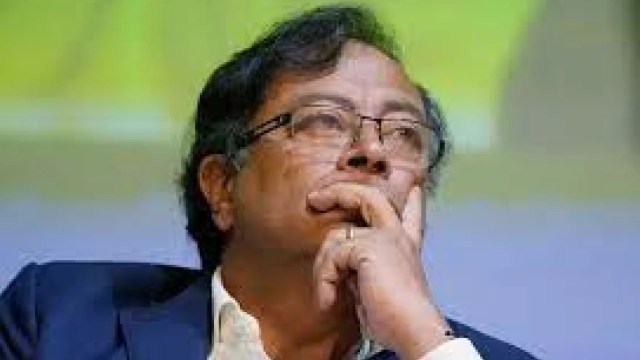
COMMENTARY When leftist Gustavo Petro becomes Colombia’s president on Sunday, his credibility will rely a lot on how firmly he pressures leftist Venezuela.
By WLRN – Tim Padgett
Aug 3, 2022
When I arrived in Caracas as a graduate student in the fall of 1985, I didn’t fully understand why so many Colombians were fleeing their country for Venezuela. But I got educated real quick the morning of Nov. 6 that year – when guerrillas from the leftist rebel movement known as M-19 stormed the Palace of Justice in Bogotá in a siege that left 12 Supreme Court justices dead.
It was a dark, defining moment of Colombia’s half-century-long civil war, which killed more than 200,000 people. And it drove home for me why Venezuela was giving refuge to so many Colombians – and why Venezuelan governments felt a special responsibility to help broker peace in Colombia. That included urging conservative Colombian leaders like then-President Belisario Betancur to engage the country’s leftist rebels and address the brutal socioeconomic inequality that sparked the conflict in the first place.
That diplomatic onus has now been reversed – and thrust onto Colombia’s president-elect, Gustavo Petro, who takes office on Sunday. This is, remember, Gustavo Petro the former leftist rebel, who once belonged to the same M-19 guerrilla group that terrorized Colombia’s high court in 1985.
If anyone should appreciate the urgency of leaning on the government next door – in this case Venezuela’s disastrous and dictatorial socialist regime, which is responsible for an epic humanitarian crisis that’s driven some 2 million people to take refuge in Colombia in recent years – it’s Petro. If anyone should embrace the need to push Venezuelan President Nicolás Maduro into pulling the country off its catastrophic path to Cuba-dom, it’s Petro.
Problem is, if anyone hasn’t yet really shown the world that he gets all that — it’s Petro.
Last week Petro announced he’ll restore diplomatic relations with Venezuela. He’ll likely also recognize Maduro as Venezuela’s legitimate head of state, even though Colombia, the U.S. and almost 60 other countries have called Maduro’s 2018 re-election illegitimate.
Petro’s been somewhat critical of Venezuela’s hyper-authoritarian regime – but as president he’s got to be more than somewhat committed to pushing Maduro to re-democratize the country.
Granted, recognizing opposition leader Juan Guaidó as Venezuela’s legitimate president has always been a far more symbolic than practical gesture; and having Colombia treat him like el presidente again may well make Maduro more disposed to listen to Petro’s urgings about restoring democracy in Venezuela.
That is, if that’s what Petro actually urges. He’s been somewhat critical of Venezuela’s hyper-authoritarian regime and what he’s called “the crushing of dissent” there. But the hemisphere needs him to be more than somewhat committed to getting Maduro committed to holding a genuinely transparent presidential election in 2024; to releasing the almost 1,000 political prisoners languishing in Venezuelan jails; to ensuring more than just regime loyalists get the food, medicine and other necessities most Venezuelans struggle to locate every day.
It needs Petro to be a full-throated advocate for freedom in Venezuela.
CRIMES AGAINST HUMANITY
Instead, Petro often prefers to chide his countrymen for criticizing Venezuela when, he says, they should be focused on the government atrocities committed during Colombia’s civil war, which finally ended in 2016. Among them was the infamous “false positives” scandal in the 2000s, when the Colombian military under right-wing former President Alvaro Uribe murdered thousands of innocent civilians and called them guerrilla combatants.
But the left, including the M-19 in 1985, committed its own atrocities in the Colombian conflict. And the bottom line for Petro when he becomes Colombia’s president is that U.N. investigators have accused the leftist Venezuelan regime of committing crimes against humanity, including the killings of more than 5,000 anti-Maduro activists.
If Petro can’t or won’t see that Maduro is no less deserving of his opprobrium and pressure than Uribe was, then his presidency is headed fairly quickly for two big headaches.
The first is a crisis of credibility with the international community – which will consider Petro just one more clueless, hypocritical left-winger incapable of holding brutal left-wingers to the same standards he applies to brutal right-wingers.
The second is a potential new flood of Venezuelan refugees. Should Maduro feel emboldened by the pass he gets from Colombia’s presidential palace – should he decide to ramp up his political oppression and economic insanity – Petro can expect más venezolanos straining Colombia’s resources.
Petro got elected pledging to tackle problems, including the lingering inequality, still plaguing Colombia. But, whether he likes it or not, that means more than somewhat confronting the Venezuelan problem, too.
…
Read More: WLRN – If Petro wants to tackle Colombia’s problems, he’ll have to confront Venezuela’s too
…

